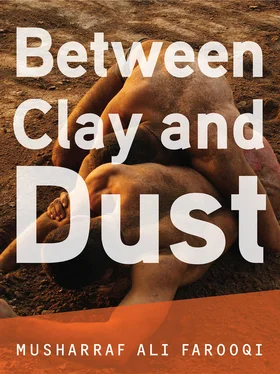Gohar Jan entered the room and stopped when she found Banday Ali with strangers. “Who’re these people?”
“Municipal inspectors,” Banday Ali answered.
“We need to see the other rooms,” the supervisor said.
“Come this way, please,” Banday Ali conducted them inside after Gohar Jan nodded her permission.
The ceiling of the Music Room was also leaking. The municipal inspectors noted the bucket that had been placed under the leak to collect the rainwater.
“The place is falling apart,” the supervisor said. “How long ago was it constructed?”
“It was built ninety-five years ago,” Gohar Jan answered. “The construction is sturdy. Only the ceiling needs some repairs.”
The supervisor sniggered but said nothing.
“What is the purpose of this inspection?” Banday Ali asked.
“To determine whether or not the building is habitable.”
“It is habitable. It just needs repairs,” Gohar Jan said calmly.
“Please listen,” Banday Ali said to the supervisor. “Sometimes there are small cracks like these in new constructions, too. Once the rains are over, we will get the repairs done. All the roof needs is a new layer of plaster. That is all. The building itself is very sturdy.”
“Do whatever you like,” the supervisor said looking around. The other man noted something in his logbook.
“At least make a note that the roofs will be plastered in a month’s time,” Banday Ali insisted.
The subordinate looked at the supervisor.
“Yes, yes. We have noted it down,” the supervisor said, casting an angry glance at his subordinate.
“When will we know the results of your inspection?” Gohar Jan asked.
“The municipality will send you a letter.”
“Do you know when?”
“We don’t know all that. Once the inspection is done you will hear from the municipal office,” he replied as he turned towards his companion. “Let’s go,”
Banday Ali saw them look around as they went out.
“Ask the old man now,” Banday Ali heard the supervisor whisper as he saw them out.
“What time is the mehfil tonight?” the subordinate asked.
“There are no mehfils here now,” Banday Ali replied.
The supervisor stepped out of the door, but the other lingered.
“Don’t lie,” he said. “I saw the ankle-band and the instruments.”
“What is he saying?” the superior shouted from the bottom of the stairwell.
“We will pay,” the man said patting the wallet in his breast-pocket.
“No mehfils are held here,” Banday Ali said curtly and began closing the door on him. “This is a private residence now.”
A scowl appeared on the man’s face but Banday Ali had shut the door.
When he came inside he saw that Gohar Jan looked pensive.
“I do not have a good feeling about it,” Banday Ali said. “You should go straight to the mayor. You know him… He will not refuse you.”
“He may, or may not.”
“But we may not have a roof over our heads soon…”
“There’s still time. Let me think carefully about it.”
❖
In the continuing daily rains Ustad Ramzi’s enclosure was inundated by the overflow from the sewers of the inner city. Sewage water stood waist-high over the graves of Ustad Ramzi’s forefathers in the cemetery. He had to herd the peacocks into a shed in the enclosure, but it was a small place, and he felt sorry when dirt soiled their tail feathers.
It was alleged by many that the builders had conspired to divert the sewer water to Ustad Ramzi’s enclosure. The walls of the drains had been breached overnight. But no one was caught or seen making the breach. Ustad Ramzi had no proof.
The rains became less intense, but did not end. It was a near impossibility to drain such a large area with manual help because the sloping land had made it a natural pool.
Having failed in their attempts to drain the water by carrying it away in buckets, the trainees told Ustad Ramzi that it would be futile to continue with the labor until the rains stopped. Ustad Ramzi, who had worked with them, realized that this request was not motivated by a lack of will. It was simply not practical to go on. And yet the sight of the graveyard inundated with sewage did not let him have any peace.
One morning Ustad Ramzi put on all his decorations and medals and tied a starched turban on his head in preparation for a visit to the municipal director.
After a long wait the clerk called out his name. He parted the dusty curtains and entered the office whose sole occupant was a shriveled, bespectacled man. Without looking up, he wrote steadily in a file that lay open before him. Ustad Ramzi softly mumbled a greeting. Receiving no response, he hesitantly drew out one of the empty chairs, and sat down to wait for the director to finish his work.
A few moments later the director raised his head and looked at Ustad Ramzi. Thinking that perhaps the director had forgotten his name, Ustad Ramzi introduced himself and briefly told him about his renowned clan’s history.
The director listened to Ustad Ramzi’s recital impassively and without interruption. Ustad Ramzi finally explained the situation and requested that the director send over one of the trucks fitted with pumping equipment to his enclosure. He offered to pay the expense of the staff required to do the work.
The director listened to his request with a growing expression of incredulity and then replied in a studied tone of voice, “It is not possible to send government equipment on private business. Once that sort of thing starts it will throw the functioning of the department into disarray. I have disciplined the staff on previous occasions for such activities. Where would I stand if I were to sanction such a thing myself?”
Ustad Ramzi spoke a little excitedly then, reminding him that the akhara was taxed as a commercial property, and it was the responsibility of the municipality to provide assistance when required.
The municipal director sat back in his chair, clasped his hands together as if to compose his thoughts, and after a few moments of silence began to explain impassively that his resources were already constrained. He could not keep offering favors. He did not mean any disrespect to the dead, but the living had a greater right to municipal services. And it was best for the dead to sleep in graveyards. He had heard recently that the builders had made Ustad Ramzi an offer to that effect. He wondered why Ustad Ramzi did not move the graves to the graveyard and the akhara elsewhere.
There had been complaints about stagnant water from other parts of the inner city as well, he told Ustad Ramzi, and if a recommendation was made, and one or more tankers were assigned to drain the areas, Ustad Ramzi’s request would be considered on its merit. He could fill out a complaint form on the way out.
Ustad Ramzi quietly took his leave and stepped outside. His hands shook as he filled out the complaint form. During the humiliating interview he had controlled his anger more than once.
❖
When he visited Gohar Jan’s place that evening it was drizzling again. The Music Room’s roof was still leaking. At regular intervals a few drops fell into the vessel on the floor.
After the recital ended Gohar Jan looked searchingly at Ustad Ramzi.
He had not touched the cup of tea that had been offered to him. Hearing a crack of thunder Ustad Ramzi started and made to leave, but Gohar Jan stopped him.
“You look preoccupied. What is the matter?”
Ustad Ramzi mentioned the flooding in the graveyard and his visit to the municipality. He told her he had decided to go and plead again with the director.
“Your rose garden must have been damaged too,”
Gohar Jan said after a moment’s silence.
Читать дальше












